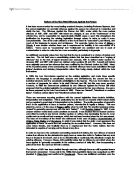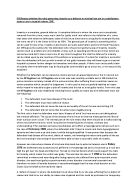Reform of the law on murder.The law commission say it is rickety structure set on shaky foundations and is in dire need of reform. The whole offence as an overview is complex, unclear, uncertain and unfair.
Reform of Murder Murder is a common law offence which is interpreted by the courts. The current common law offence was defined by coke in the 17th century and still exists today. It also doesn't allow for any differentiation between different kinds of killing. Which now, there are many different types of killings such as serial killings, euthanasia, mercy killings etc and therefore the law should adapt to support this. The law commission say it is "rickety structure set on shaky foundations" and is "in dire need of reform". The whole offence as an overview is complex, unclear, uncertain and unfair. In regards to the actus reus, there are some problems with many aspects including cokes definition of "unlawful killing of a human being". First, for the term "human being", it is a bit confusing into what counts as life, and what counts as death in regards to murder. The term "life" is defined in AG ref (NO3 1994) as being from when you are born and breathing independently from the mother. However, for death there is no legal definition, only a medical one of "brain stem" death Malcherek and steel. It doesn't seem to make sense that there is a legal definition for life but not for death, there should be a legal definition for both. In regards to "unlawful killing", this is an issue of causation. There are different opinions on the way self neglect such as in the case Dear
Briefly explain the meaning of, and reasons for, strict liability as a criminal offence
Briefly explain the meaning of, and reasons for, strict liability as a criminal offence (8 marks) Strict liability are offences which require no mens rea. A person can be guilty of the offence by just having the actus reus. This can seem unfair as one may not have the intention to commit the offence but just by having the conduct and consequence is sufficient. For example, in relation to speeding, it is sufficient if one can prove that they are above the speed limit, the intention of speeding is not required. As seen in the case of Larsonneur, the defendant didn't have the intention to return back to the UK, hence there was no mens rea; however, the act of being present in the UK was sufficient for a strict liability offence. Some examples of strict liability offences can include parking and speeding offences, selling unfit food for human consumption, health and safety at work regulations, trade description offences etc. Even though these offences may seem small, they are common as nearly 50% of strict liability cases are taken to court. The type of court would depend on the fine limit; i.e. the Magistrates court would fine up to £5000, however, the Crown court do not have a maximum penalty, but in severe cases, it could lead to imprisonment. The case of Gommon (Hong Kong) LTD V Attorney General for Hong Kong was a House of Lords case. Lord Garmon sets out the
OCR Feb 10 Exam Paper Non-Fatal Offences Problem Case. The scenario states that Colin ran towards Sarah waving a knife. The actions by Colin caused Sarah to scream.
OCR Feb 10 Exam Paper - Non-Fatal Offences Sarah is walking home when Colin runs towards her waving a knife. Sarah Screams. Colin grabs Sarah's coat and then punches her in the face which breaks her nose and causes her to fall to the ground. Gregory, a passer-by, runs to help Sarah. Colin lunges wildly at Gregory with the knife and slashes Gregory's hand, causing severe bleeding. Colin takes aim and kicks Sarah in the stomach, causing serious internal injuries. [35] The scenario states that Colin ran towards Sarah "waving a knife". The actions by Colin caused Sarah to scream. The Actus Reus for assault is 'any act which causes the 'victim' (V) to fear immediate unlawful force'. The meaning of immediate was defined in the Smith (1983), a case where a man looked into the window of a women in her flat thus causing her to be terrified, as to meaning "imminent". The fact that Sarah screamed after seeing Colin running towards her illustrates she feared of action imminently. The Mens Rea for Assault is 'intention or recklessness to cause another to fear immediate unlawful force'. By referring to the definition set out in Smith, Richard waving the knife around, coupled with him heading towards Sarah, clearly shows that he was reckless as to make Sarah fear imminent unlawful force. Colin is therefore guilty of committing the Common Law offence of assault, and can be sentenced up to
Voluntary Manslaghter - Notes and Evaluation.
Voluntary Manslaughter Voluntary Manslaughter is the term given to situations in which the defendant would be guilty of murder (i.e. he had the intention to kill or cause GBH) but due to a mitigating factor he is only guilty of manslaughter. These mitigating factors are when the killing occurs when the defendant is under diminished responsibility, provocation or a suicide pact. All of these defences are set out in the Homicide Act 1957. The defences are only available to murder and are only partial defences, which means that the defendant is not completely acquitted; the charge is reduced to manslaughter. Provocation - S3 Homicide Act 1957 "Where, on a charge of murder, there is evidence on which the jury can find that the person charged was provoked (whether by things done or by things said or by both together) to lose his self control, the question whether the provocation was enough to make a reasonable man do as he did shall be left to be determined by the jury." The defence consists of two elements; 1.) Did the defendant lose his self control? 2.) Would a reasonable person have lost his self-control? .) Did the defendant lose his self control? This is a subjective test in which the jury must be satisfied that the defendant lost his self control as a result of the provocation. In Duffy (1949) it was said that there must be a "sudden and temporary loss of self
Actus reus
'Law should encourage citizens in their civil duty to "do the right thing" in a moral sense and not turn a blind eye or fail to act to help someone who is in need.' Consider to what extent the criminal law relating to commission reflects this view. Omission is when the defendant does nothing to prevent the victim's death. In certain circumstances, D may be under a duty to take positive steps to assist V, and if D fails to take those steps then he can be liable for murder or manslaughter. If D is liable for V's death, he must be under a duty to act in the circumstances, otherwise he will escape liability. This was shown in Khan and Khan, in this case D escaped liability as there was no imposition of duty of care. Duty of care can be owed in a variety of situations. One of these situations is when duty arises out of contractual liability; where failure to fulfil a contract is likely to endanger lives, the criminal law will impose a duty to act. The duty is owed to anyone who may be affected, not just the parties to the contract. This was demonstrated in Pittwood, where D's argument was rejected as his duty was owed to the railway company as well as to those who were affected. Duty of care can also arise out of relationship; this was shown in Gibbons and Proctor. The father owed V duty of care as he was related to her; however his lover, P, was not related to V but was

















